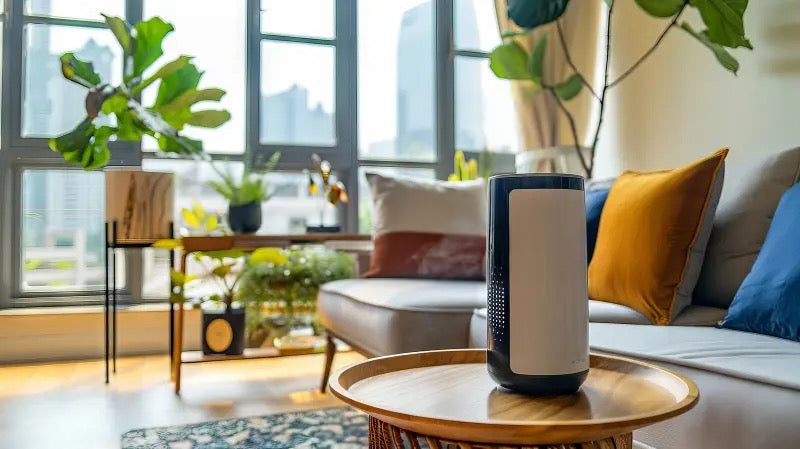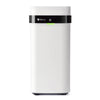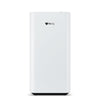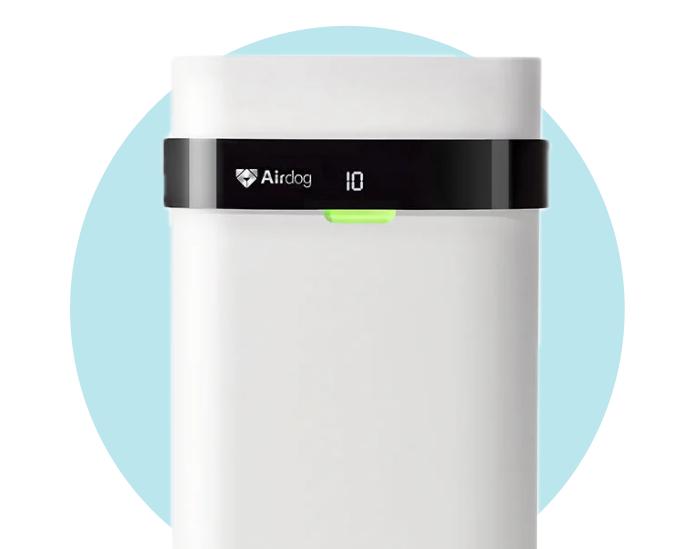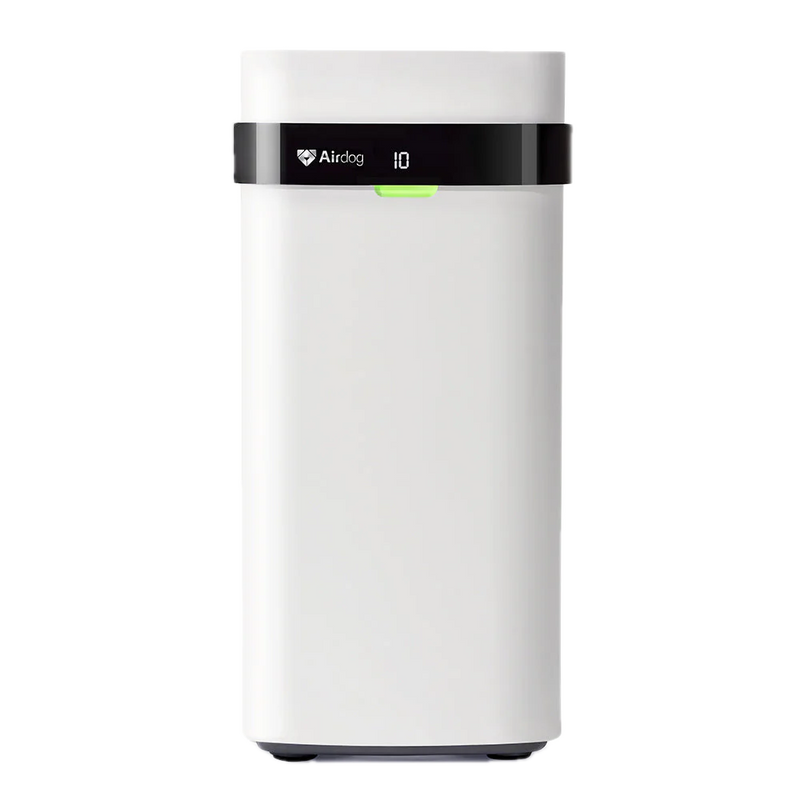Indoor air quality has become a top priority for millions of households, especially for those managing allergies, asthma, or other respiratory issues. If you’re looking to buy one for any of these reasons, you’re probably wondering, are air purifiers FSA eligible?
The answer is sometimes. If an air purifier is deemed medically necessary by a licensed healthcare provider, you may be able to use funds from a Flexible Spending Account (FSA) or Health Savings Account (HSA) to purchase one.
What Are FSAs and HSAs?
Flexible Spending Accounts (FSAs) and Health Savings Accounts (HSAs) are both tax-advantaged accounts that allow you to set aside pre-tax dollars to pay for qualified medical expenses. Both options can lead to significant tax savings, making them powerful tools for reducing out-of-pocket expenses.
FSA and HSA accounts can be used to cover a broad range of eligible expenses, from prescriptions and doctor visits to certain medical equipment, including air purifiers if they are prescribed for a medical necessity.
When Are Air Purifiers FSA or HSA Eligible?
An air purifier typically qualifies only if it’s deemed medically necessary. This means your purchase must be linked to a medical condition that requires improved air quality for treatment or symptom relief.
Common qualifying conditions include environmental allergies, sensitivity to mold spores, or chronic respiratory issues such as asthma. In these cases, cleaner indoor air can play a critical role in reducing triggers and improving daily well-being.
According to IRS Publication 969 and the FSA Eligibility List, air purifiers can be included under qualified medical expenses when prescribed for health reasons, meaning the right documentation is essential for approval. To meet IRS guidelines, you’ll need a Letter of Medical Necessity (LMN) from a licensed medical professional. This document must clearly specify your diagnosed condition and explain how the air purifier will help manage or treat it. Without this letter, the purchase is unlikely to be considered an eligible medical expense.
Medical Benefits of Using Air Purifiers
If your air purifier purchase meets the IRS requirements and is backed by a Letter of Medical Necessity, the right selection can deliver meaningful, long-term improvements to your quality of life. By reducing allergens, pollutants, and other airborne irritants, these devices can address the root causes of many health issues, helping you breathe easier and live more comfortably day to day.
Improved Indoor Air Quality
An air purifier can significantly enhance indoor air quality by removing dust, pollen, smoke, and other allergens from the air. This is particularly important for individuals living in areas with high pollution levels or seasonal allergens. Cleaner air means fewer triggers for allergy symptoms and greater comfort in daily life.
Relief from Respiratory Issues
By reducing airborne irritants, air purifiers can help alleviate common respiratory issues such as asthma flare-ups, chronic coughing, and sinus congestion. For some individuals, this can also lead to a decreased reliance on medications, supporting both health and long-term healthcare cost savings.
Cleaner Air While You Sleep
Running an air purifier overnight helps maintain cleaner indoor air during sleep, which may lower the risk of nighttime asthma attacks, congestion, or other breathing difficulties.
Reduced Exposure to Mold Spores
Air purifiers with advanced filtration can capture and neutralize mold spores and other microscopic irritants before they circulate through your home. This is especially valuable in humid environments or older buildings where mold growth may be a concern.
Enhanced Overall Well-Being
Cleaner air not only supports physical health but also contributes to improved focus, mood, and energy levels. Over time, reducing exposure to airborne pollutants can lead to a measurable improvement in overall well-being and may even contribute to a long-term reduction in healthcare costs.
Why Airdog Air Purifiers Are a Smart FSA/HSA Choice
If your healthcare provider has confirmed the medical necessity of an air purifier and you’re ready to use your HSA or FSA funds, the next step is choosing the right model. While many eligible air purifiers on the market use HEPA filtration, Airdog takes air cleaning to the next level with its patented Two-Pole Active Filtration Technology® (TPA). This advanced system captures airborne particles as small as 0.0146 microns. More importantly, instead of merely trapping contaminants, Airdog’s TPA actively destroys bacteria and viruses, providing a deeper level of protection for those with medical needs.
This patented design makes Airdog especially beneficial for people managing respiratory issues, households dealing with mold, pet dander, or other environmental pollutants, and anyone seeking cleaner indoor air without ongoing filter costs. For HSA or FSA buyers, this means not just meeting eligibility requirements but investing in a long-term solution that protects both your health and your wallet.
How to Use Your HSA or FSA for an Air Purifier
If you’ve confirmed that your medical condition qualifies and your HSA or FSA dollars could cover your air purifier purchase, the next step is navigating the process correctly. A little preparation can ensure your claim is approved the first time, saving you both time and stress. Here’s how to make sure your purchase meets the requirements for eligible expenses while maximizing your tax-advantaged accounts.
Step 1: Confirm Eligibility
-
Check with your FSA or HSA provider to see if they cover air purifiers.
-
Ask if there are preferred eligible air purifiers or brand restrictions.
Step 2: Get a Letter of Medical Necessity
-
Request this from your healthcare provider.
-
Ensure it clearly states your diagnosis and the need for cleaner indoor air.
Step 3: Choose Your Payment Option
-
Use your FSA card or HSA debit card directly for purchase.
-
Or pay out of pocket and submit documentation for reimbursement.
Step 4: Keep Your Records
-
Save receipts, your LMN, and any related medical documentation.
-
This protects you in case of an audit.
Step 5: Don’t Forget Accessories
-
Replacement filters may also be eligible—check with your provider before purchase.
Following these steps will help ensure your air purifier purchase is processed without delays, allowing you to use your FSA or HSA funds effectively.
Breathe Better with Airdog
If your medical professional recommends an air purifier, don’t settle for outdated HEPA technology. Airdog’s advanced, washable systems actively remove the tiniest threats to your health, making them a smart, cost-effective choice for qualified customers using HSA or FSA accounts. Explore our air purifiers today and start enjoying clean air.




